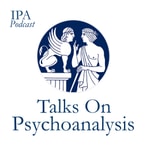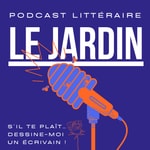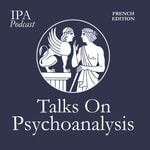Talks On Psychoanalysis – Détails, épisodes et analyse
Détails du podcast
Informations techniques et générales issues du flux RSS du podcast.

Talks On Psychoanalysis
International Psychoanalytical Association
Fréquence : 1 épisode/20j. Total Éps: 96

Classements récents
Dernières positions dans les classements Apple Podcasts et Spotify.
Apple Podcasts
🇬🇧 Grande Bretagne - socialSciences
02/08/2025#30🇩🇪 Allemagne - socialSciences
02/08/2025#34🇺🇸 États-Unis - socialSciences
02/08/2025#57🇫🇷 France - socialSciences
02/08/2025#53🇬🇧 Grande Bretagne - socialSciences
01/08/2025#16🇺🇸 États-Unis - socialSciences
01/08/2025#45🇫🇷 France - socialSciences
01/08/2025#35🇬🇧 Grande Bretagne - socialSciences
31/07/2025#19🇺🇸 États-Unis - socialSciences
31/07/2025#54🇬🇧 Grande Bretagne - socialSciences
30/07/2025#26
Spotify
Aucun classement récent disponible
Liens partagés entre épisodes et podcasts
Liens présents dans les descriptions d'épisodes et autres podcasts les utilisant également.
See all- https://musopen.org/
382 partages
- https://musopen.org
142 partages
- https://anchor.fm/talksonpsychoanalysis-fr
26 partages
Qualité et score du flux RSS
Évaluation technique de la qualité et de la structure du flux RSS.
See allScore global : 58%
Historique des publications
Répartition mensuelle des publications d'épisodes au fil des années.
The Desire and Passion for a Child - Dr. Patricia Alkolombre
Saison 1 · Épisode 91
mercredi 21 août 2024 • Durée 28:36
In today’s context of reproductive technologies, one has the idea that we might have more control over the process of reproduction. No longer necessarily linked to sexuality, reproduction and parenthood can occur in a multitude of ways, pushing the boundaries of what was not thought to be possible or acceptable. These biotechnical innovations have not only changed the ways that one can become a parent but also necessarily suggest new areas for psychoanalytic theorizing.
In this podcast episode, Dr. Patricia Alkolombre discusses how the desire for a child has become in some cases, the passion for a child “at any price”, made more urgent and concentrated as the biotechnical innovations offer us the sense that we have control over our bodies and their reproductive and gestational functions in new ways. She discusses what this means for psychoanalytic understandings of gender, parenthood, femininity, loss, disappointment, narcissism and our understandings of ourselves and how this new era of reproduction ushers in a new set of clinical issues.
Dr. Patricia Alkolombre holds a PhD in Psychology from the University of Salvador. She is a Training and supervising analyst of the Argentine Psychoanalytic Association and is the current Overall Chair of the IPA Committee on Women and Psychoanalysis. She gives seminars in many post-graduate institutions and mental health centers in Buenos Aires and in psychoanalytic institutions abroad, among them are the Psychoanalytic Association of Guadalajara, the Brazilian Society of Porto Alegre, Brazil.
She is the author and editor of several books. Among them are: The Desire and Passion for a Child: Psychoanalysis and Contemporary Reproductive Techniques (Routledge, 2023) in Spanish and english. She is also the author and the editor of the book Travesías del cuerpo femenino (2012) (Declared of Interest in Culture and Health by the Legislature of the City of Buenos Aires).
She is co-author of Changing sexualities and parental function in the twenty first century (Routledge 2017) and of Psychoanalytic Explorations of what women want today: femininity, desire, and agency (Routledge 2022).
A subtitled version of this podcast is available on our YouTube channel:
https://youtube.com/playlist?list=PLhxiwE76e0QaOquX3GujdwNLFsgxUQNXz&si=yf381EDu3pess6Yz
You can download a copy of the paper here:
https://docs.google.com/document/d/1j-ANLupJF6b44NVmlC0XSfMMml7-sprb/edit?usp=sharing&ouid=100400904585889441765&rtpof=true&sd=true
This Podcast Series, published by the International Psychoanalytical Association, is part of the activities of the IPA Communication Committee and is produced by the IPA Podcast Editorial Team. Co-Editors: Gaetano Pellegrini and Nicolle Zapien. Editing and Post-Production: Massimiliano Guerrieri.
To stay informed about the latest podcast releases, please sign up today.
This episode has also been published in Spanish.
This episode has also been published in Portuguese.
Freud, his passion for travel, and its impact on psychoanalytic discoveries - Patricia O'Donnell
Saison 1 · Épisode 90
mardi 25 juin 2024 • Durée 22:40
What is it that is so captivating about travel? In Freud’s travel letters chronicling his experiences over many decades in different countries, there are the seeds of the advance of non-clinical experiences of psychoanalysis. Travel takes us to another place with unfamiliar surroundings so that we might see anew that which we may otherwise take for granted. Awe and beauty are often experiences we have while abroad. And these are described by Freud over and over again in these captivating letters.
In this podcast episode, Dr. Patricia O’Donnell discusses Freud’s travel letters and his musings on the pleasures of travel, art, and architecture, as experiences that inspire awe and transcendence. She links these experiences to the unconscious fantasizing that stems from curiosity, rooted in infantile sexuality and that gives rise to the desire to know and triggers of experiences of passion.
Dr. Patricia O’Donnell is a psychiatrist, a full member and training analyst of the Argentine Psychoanalytic Association and a member of the International Psychoanalytic Association. She is also an Associate Professor at the Department of Mental Health at the Hospital de Clinicas Jose de San Martin. She has presented papers at national and international conferences and delivered workshops and lectures on psychoanalytic art research. She has written numerous articles and co-authored books on topics ranging from psychoanalysis and creativity, art and literature.
A subtitled version of this podcast is available on our YouTube channel: https://youtube.com/playlist?list=PLhxiwE76e0QaOquX3GujdwNLFsgxUQNXz&si=yf381EDu3pess6Yz
You can download a copy of the paper here: https://docs.google.com/document/d/1-dthE_sMLxYjtDl4uWWTuEdYD4THtjSN/edit?usp=share_link&ouid=100400904585889441765&rtpof=true&sd=true
This Podcast Series, published by the International Psychoanalytical Association, is part of the activities of the IPA Communication Committee and is produced by the IPA Podcast Editorial Team. Co-Editors: Gaetano Pellegrini and Nicolle Zapien. Editing and Post-Production: Massimiliano Guerrieri. To stay informed about the latest podcast releases, please sign up today.
This episode has also been published in Spanish.
Time matters - the self and its continuity. Georg Northoff.
Saison 1 · Épisode 82
jeudi 20 avril 2023 • Durée 21:38
Our self is always there and present throughout our whole life. Despite the many social, environmental and ecological changes as well as the major bodily changes, our self remains one and the same throughout the changes of our life. Where and how is the temporal continuity of our self coming from?
Georg Northoff is a philosopher, neuroscientist and psychiatrist, holding degrees in all three disciplines. He works in Ottawa/Canada holding a Canada Research Chair for Mind, Brain Imaging, and Neuroethics. His research focuses on the relationship between brain and mind. The question driving him is: “why and how can our brain construct mental features like self, consciousness, etc.” His approach to this complex answer is as unique as it is simple: he proposes that the brain’s constitutes its own inner time and space which, if properly aligned to and synchronized with the world’s outer time and space, will yield mental features like self and consciousness. This led him to develop a spatiotemporal theory of brain-mind relationship in all three fields, neuroscience, psychiatry and philosophy.
He is one of the leading figures in linking philosophy, psychiatry, and neuroscience having developed non-reductive neurophilosophy. He authored over 300 journal articles and 18 books in neuroscience, psychiatry and philosophy which are translated into several languages including “Neuro-philosophy and the Healthy Mind” (2016) Norton Publisher, and “Neurowaves" (McGill University Press 2023) and "Neuropsychoanalysis, an introduction" (Routledge 2023).
This episode is available also in German
All papers etc, can be found on the website: www.georgnorthoff.com
See recent Podcast for broader audience: www.youtube.com/watch?v=lDX3xOVHB18&t=237s
References:
Spagnolo R, Northoff G (2022) The dynamic self in psychoanalysis. Routledge
Northoff G (2023) Neuropsychoanalysis. An introduction. Routledge publisher
Northoff G (2023) Neurowaves. Brain, time and consciousness. McGill University Press
Northoff G, Scalabrini A. (2021) "Project for a Spatiotemporal Neuroscience" - Brain and Psyche Share Their Topography and Dynamic.
The Self and its continuity: Out of body experience - Rosa Spagnolo.
Saison 1 · Épisode 81
mardi 21 mars 2023 • Durée 17:42
What is the relationship between the mind and the body, and how does it shape our understanding of the self? In this episode, Rosa Spagnolo presents her reflections on the topic, published in her recent book, written with Georg Northoff. In the book, she delves into how out-of-body experiences can shed light on the complex dynamics between the self and the world. She examines the relationship between the body and the brain, the role of time and space in shaping our experience of the self, and the intersection between psychoanalysis and neuroscience. Along the way, she touches on the potential implications of virtual reality on our sense of self.
Rosa Spagnolo, MD, Child Neuropsychiatrist; Developmental Psychotherapist; Psychoanalyst, Full Member of the Italian Psychoanalytic Society (SPI), IPA Member. She is Co-Chair and co-founder of the Italian Psychoanalytic Dialogues (IPD) association, which organizes annual Rome Conferences, on psychoanalytic and neuroscientific issues. She is a member of NPSA and chair of the "Italian Group of NPSA". She is chair of the IPAWEB page: the Psychoanalysis in the Age of Neuroscience and chair of the SPIWEB page of Neuroscience.
Teaches "Psychology of Nutrition" and "Treatment of Eating Disorders" at the University - Tor Vergata -, Rome, Master II level in "Diagnosis and Treatment of Eating and Weight Disorders". Teaches "Psychoanalysis and Culture" at the Graduate School of Psychoanalytic and Group Analytic Psychotherapy. Works in Rome at the Filippo Smaldone Institute for the rehabilitation of deafness, learning and speech disorders, neurodevelopmental disorders. She is the author of numerous publications as well as a conference speaker and lecturer on neuropsychiatric developmental disorders and psychoanalytical topics.
Books
Spagnolo R. (2012): La forza delle immagini attraverso la catena associativa dell’analista. In: Domenico Chianese e Andreina Fontana (Eds), Per un sapere dei sensi. Immagini ed estetica psicoanalitica. Roma: Edizione Alpes, 2012
Spagnolo R.(2016) : La ricerca empirica sul sogno, in: Antonello Colli. Psicoterapia Psicodiamica (pp. 232-234). Roma : Carrocci Editore, 2016
Spagnolo, R. (2017). An unexpected Pathway for Interpsychic Exchange: Music in the analysis of Young Adult. In B.N. Seitler & K.S. Kleinman (Eds.), Essays from Cradle to Couch (pp. 341-357). IPBooks, Astoria: NY.
Spagnolo R. (ED) (2018): Building Bridges, The impact of Neuropsychoanalysis on Psychoanalytic Clinical Sessions. Routledge, London and New York. Nominato al Gradiva Awards, New York, 2019
Spagnolo R. & Northoff G.(2021): The Dynamic Self in Psychoanalysis. Neuroscientific foundations and clinical cases. Routledge, London and New York
Spagnolo R. & Northoff G (2022): Il Sè dinamico in psicoanalisi. Fondamenti Neuroscientifici e clinica Psicoanalitica. Franco Angeli Editore.
Spagnolo R. (2007) "Chantal" - Maremmi Editore, Firenze.
This episode is available also in Italian
This episode was read by Eleonora Maruca. Editing and Post-Production: Massimiliano Guerrieri.
Notes on the aptitude for happiness - Marion Minerbo
Saison 1 · Épisode 80
lundi 6 mars 2023 • Durée 35:46
Happiness is humans' undeniable desire, but why does it seem so within reach for some, and so rare and difficult for others? What makes it possible from the psychic perspective?
In this episode, Dr. Marion Minerbo shares with us, in a clear and concise voice, her studies on the aptitude for happiness. The author describes brief moments of happiness and from them highlights the psychic elements engaged in making this experience possible. Firmly based on psychoanalytic theory and illustrated with simple everyday life moments, she illuminates and clarifies what she calls aptitude for happiness".
Marion Minerbo, MD, PhD. is a full member and training analyst at the Brazilian Psychoanalytic Society of São Paulo. In 2015 she received the award for the best work of training analysts at the Brazilian Congress of Psychoanalysis on "Contributions to a theory on the constitution of the cruel superego". She has previously published dozens of articles and the following books: "Conversations on clinical practice"; "New dialogues on psychoanalytic clinic”; "Neurosis and non-neurosis” ; "Transference and Countertransference"; "A posteriori, a journey", all by Blucher Editorial, São Paulo, all of which published in Portuguese.
Her new book, “Notes on the Aptitude for Happiness”, is in press.
This episode is available also in French
and Portuguese
Hidden unconscious, buried unconscious, implicit unconscious - Stefano Bolognini.
Saison 1 · Épisode 79
mercredi 11 janvier 2023 • Durée 19:01
This paper was published in The Italian Psychoanalytic Annual issue 16, in 2022. The full text can be found on the publisher Raffaello Cortina's website:
The Italian Psychoanalytic Annual 2022/16 https://riviste.raffaellocortina.it/scheda-fascicolo_contenitore_digital/autori-vari/the-italian-psychoanalytic-annual-2022-16-9788832854947-3807.html
The current extension of the concept of the Unconscious to different levels, configurations, and functioning of the mind is the result of decades of collective reflection on clinical work as well as on theory. Analysts today have a broader, more refined and complex knowledge of defensive and transformative processes, and this has also led to an evolution in technique. The paper we present today is a combination of psychoanalytic theory and technique through two clinical cases that present complex articulations of spurious unconscious functional areas and modalities, alternately the repressed and the not repressed.
Stefano Bolognini is a psychiatrist and training analyst of the Italian Psychoanalytic Society, of which he was Scientific Secretary and President. After serving as Representative on the first IPA Board, he became its President in 2013 and served in that role until 2017. He also founded the "IPA Encyclopedic Dictionary of Psychoanalysis" and is a member of the Advisory Board of the International Psychoanalytic University Berlin (IPU), Honorary Member of the New York Contemporary Freudian Society (NYCFS), and of the Los Angeles Institute and Society for Psychoanalytic Studies (LAISPS). Bolognini was a member of the Editorial Board of the International Journal of Psychoanalysis for 10 years, and has published over 250 psychoanalytic works, both books and papers.
This Podcast Series, published by the International Psychoanalytical Association, is part of the activities of the IPA Communication Committee and is produced by the IPA Podcast Editorial Team. Head of the Podcast Editorial Team: Gaetano Pellegrini.
Editing and Post-Production: Massimiliano Guerrieri. Proof Reading: Elizabeth Danze and Valentine Moscovici.
Why and what is gender for? - Juan Francisco Artaloytia.
Saison 1 · Épisode 78
vendredi 16 décembre 2022 • Durée 19:03
For those interested in the extensive written version on which this short talk is based, please contact the author at jfartaloytia@gmail.com .
From the Freudian conception of psychic bisexuality to the current approaches of transgenderism, the question of gender has knocked at the door of psychoanalysis to account for its articulation in the social context of its time. The different ways that people position themselves in life, confronts us with the challenge of thinking psychoanalytically about gender today.
Thus, this episode is entitled “Why and what is gender for?”.
Juan Francisco Artaloytia takes up this question. He talks about how and why gender emerged in the history of language and the species, and to what extent gender is still as important as it was in its origins.
Link to the paper https://docs.google.com/document/d/1QTbz_6lIbJRrl4N4QBwRwSAWZoP7vlgG/edit?usp=share_link&ouid=112457875385152358388&rtpof=true&sd=true
Juan Francisco Artaloytia holds a PhD, is a medical doctor, a psychiatrist and training Psychoanalyst of the Psychoanalytic Association of Madrid. He has been Secretary and Editor in Chief of the Journal of Psychoanalysis of the APM. He is currently Representative for Europe on the Board of the International Psychoanalytic Association. He has published articles and given lectures in national and international media. Freudian metapsychology is his field of reference, and topics of his special interests are psychosis, psychoanalytic training, and issues such as homosexuality and transsexuality. He has just published the book "Una metapsicología freudiana para el siglo XXI" (A Freudian metapsychology for the twenty-first century), which is a recapitulation of his work over the last 15 years.
this episode is available also in Spanish
This Podcast Series, published by the International Psychoanalytical Association, is part of the activities of the IPA Communication Committee and is produced by the IPA Podcast Editorial Team. Head of the Podcast Editorial Team is Gaetano Pellegrini. This episode was produced in collaboration with Ana Maria Martin Solar.
Editing and Post-Production: Massimiliano Guerrieri.
External and Internal Changes in Recent Times - Mercedes Puchol.
Saison 1 · Épisode 77
lundi 21 novembre 2022 • Durée 23:47
How do recent external and internal changes emerge in the theoretical-technical and clinical understanding of psychoanalysis today? How to think psychoanalytically about the topic of war today more than ever?
In this episode entitled External and internal changes in recent times, Mercedes Puchol reflects, among other things, on the impact of these changes in relation to remote analysis, and considers the notion of analysability, originally postulated by Carlos Paz in 1971, to be fundamental for thinking about all the challenges and questions that remote analysis raises.
Finally, the author, faced with the level of destruction and pain that the Russian invasion of Ukraine has caused, reflects on the importance of identifications in the "construction of emotional ties that operate against war (Freud, 1933)".
Mercedes Puchol is a clinical psychologist and psychoanalyst. She lives and works in Madrid with adults, children and adolescents. She is training analyst of the Madrid Psychoanalytical Association (APM) as well as its current President. She is a member of the Organising Committee of the Spanish Language Psychoanalysts Encounters and of the Committee of the European Psychoanalytic Conference for University Students (EPCUS).
Link to the paper https://docs.google.com/document/d/1mSeD-BL9yahdsV3XzfbovanCwRnXkp8S/edit?usp=share_link&ouid=112457875385152358388&rtpof=true&sd=true
This episode is available also in Spanish
This Podcast Series, published by the International Psychoanalytical Association, is part of the activities of the IPA Communication Committee and is produced by the IPA Podcast Editorial Team. Head of the Podcast Editorial Team is Gaetano Pellegrini. This episode was produced in collaboration with Ana Maria Martin Solar.
Editing and Post-Production: Massimiliano Guerrieri.
James Joyce and the Internal World of the Replacement Child - Mary Adams.
Saison 1 · Épisode 76
lundi 7 novembre 2022 • Durée 21:10
In this episode, Mary Adams delve into issues related to the trauma of being a replacement child. She illustrates this with the example of James Joyce, as "he seemed to overcome the debilitating effects of this early trauma and survivor guilt by using his writing".
Mary Adams is a psychoanalyst with the British Psychoanalytic Association, having completed her training in 1996. She was a training analyst with the Association of Child Psychotherapists, has a particular interest in the work of Donald Meltzer and has written several papers using his ideas. She is a past editor of the Journal of the British Association of Psychotherapy. Her book on James Joyce as a replacement child was published by Routledge in 2022.
Link to the paper https://docs.google.com/document/d/1-hL8XbcupQQXAwbwh4ow4hQkBwccIyTo/edit?usp=share_link&ouid=112457875385152358388&rtpof=true&sd=true
Further reading on the Replacement Child:
Anisfeld, L., & Richards, A. D. (2000). The replacement child: Variations on a theme in history and psychoanalysis. Psychoanalytic Study of the Child, 55: 301–318.
Capps, D. (2012). The Replacement Child: Solomonic Justice and the Sublimation of Sibling Envy American Imago, 69(3): 385-400
Pollock, G. H. (1972). Bertha Pappenheim's Pathological Mourning: Possible Effects of Childhood Sibling Loss. J. Amer. Psychoanal. Assn., 20:476-493
Pollock, G. H. (1978). On Siblings, Childhood Sibling Loss, and Creativity. Annual of Psychoanalysis 6:443-481
Reid, M. (1992). ‘Joshua — Life after death. The replacement child’, Journal of Child Psychotherapy, Vol. 18, 2. Pp. 109-138.
Sabbadini, A. (1988). The Replacement Child. Contemporary Psychoanalysis. 24: 528-547.
Schellinski , K. (2019). Individuation for Adult Replacement Children: Ways of Coming into Being. Routledge
Schwab, G. (2009). Replacement children: The transgenerational transmission of traumatic loss. American Imago 66 (3), 277-310.
Silver, D. (1983). The Dark Lady: Sibling loss and mourning in the Shakespearean sonnets. Psychoanalytic Inquiry, 3: (3): 513–527.
Storey, D. (2021). A Stinging Delight. David Story: A Memoir. Faber & Faber.
Whitebook, J. (2017). Freud. An Intellectual Biography. Cambridge UP
Wilson, E. (1988). Stendhal as a Replacement Child: The Theme of the Dead Child in Stendhal's Writings. Psychoanalytic Inquiry, 8:108-133
This Podcast Series, published by the International Psychoanalytical Association, is part of the activities of the IPA Communication Committee and is produced by the IPA Podcast Editorial Team. Head of the Podcast Editorial Team is Gaetano Pellegrini. Editing and Post-Production: Massimiliano Guerrieri.
Michael J Diamond: The Father’s Impact on Masculinity and Its Discontents.
Saison 1 · Épisode 75
mercredi 26 octobre 2022 • Durée 29:23
The paternal function is one of the most embedded concepts both in the singular dimension of clinical thinking and in the extended of social functioning. It underlies, for example, one of the foundational elements of the psychoanalytic method: the very idea of “Analytic Setting” could not exist without a paternal function.
In today's episode, thanks to the work of Michael J Diamond, we will explore its many aspects, including the construction of a triangular space, the role of the Third in the internal functioning of the subject, and the question of limits. We will also delve into more specific characteristics, such as the tenderness and sensory intimacy between a little boy and his father. We might say that this podcast episode is like a "child" of Michael J Diamond’s recent book published by Routledge and entitled: "Masculinity and Its Discontents”, in which he studies, as the subtitle says: “The Male Psyche and the Inherent Tensions of Maturing Manhood”.
Link to download the paper https://docs.google.com/document/d/1QfcWssRszuStn90QjrWXh7YvvDfGCw3A/edit?usp=sharing&ouid=112457875385152358388&rtpof=true&sd=true
Michael J. Diamond, PhD, FIPA is a Training and Supervising Analyst at the Los Angeles Institute and Society for Psychoanalytic Studies. His major publications are on psychoanalytic technique and analytic mindedness; masculinity, femininity, and gender theory; fathering and the paternal function; trauma and dissociation; hypnosis and altered states; and group processes and social action. He has written five books including today’s featured book on Masculinity and Its Discontents: The Male Psyche and the Inherent Tensions of Maturing Manhood published by Routledge. His most recent book on applied psychoanalysis, Ruptures in the American Psyche: Containing Destructive Populism in Perilous Times, was just published (by Phoenix Publishing). His other major books include My Father Before Me: How Fathers and Sons Influence Each Other Throughout Their Lives and an edited book on The Second Century of Psychoanalysis: Evolving Perspectives on Therapeutic Action (with Chris Christian). He is the honored recipient of numerous awards for his teaching, writing, and clinical contributions, and has a full-time clinical practice in Los Angeles, California where he remains active in teaching, supervising, and writing.
Selected Recommended Readings for Michael J. Diamond’s Podcast
Blos, P. (1985). Son and Father: Before and Beyond the Oedipus Complex. New York: Free Press.
Corbett, K. (2009). Boyhoods: Rethinking Masculinities. New Haven, CT: Yale University Press.
Diamond, M. J. (2004). The shaping of masculinity: revisioning boys turning away from their mothers to construct male gender identity. Int. J. Psychoanal., 85:359–380.
Diamond, M. J. (2006). Masculinity unraveled: the roots of male gender identity and the shifting of male ego ideals throughout life. J. Amer. Psychoanal. Assn., 54:1099–1130.
Diamond, M. J. (2007). My Father Before Me: How Fathers and Sons Influence Each Other Throughout Their Lives. New York: Norton.
Diamond, M. J. (2015). The elusiveness of masculinity: primordial vulnerability, lack, and the challenges of male development. Psychoanal. Q., 84:47–102.
Diamond, M. J. (2017). The missing father function in psychoanalytic theory and technique: the analyst’s internal couple and maturing intimacy. Psychoanal. Q., 86:861–887.
Diamond, M. J. (2020). The elusiveness of “the feminine” in the male analyst: living in yet not being of the binary. Psychoanal. Q.,89:503–526.
Diamond, M. J. (2021). Masculinity and Its Discontents: The Male Psyche and the Inherent Tensions of Maturing Manhood. London: Routledge.
Freud, S. (1905). Three essays on the theory of sexuality. S. E., 7:130–243.
Friedman, R. C. & Downey, J. L. (2008). Sexual differentiation of behavior: the foundation of a developmental model of psychosexuality. J. Amer. Psychoanal. Assn., 56:147–175.
Glasser, M. (1985). The “weak spot”—some observations on male sexuality. Int. J. Psychoanal., 66:405–414.
Laplanche, J. (1997). The theory of seduction and the problem of the other. Int. J. Psychoanal., 78:653–666.
Lax, R. F. (1997). Boys’ envy of mother and the consequences of this narcissistic mortification. Psychoanal. Study Child, 52:118–139.
Moss, D. (2012). Thirteen Ways of Looking at a Man: Psychoanalysis and Masculinity. London: Routledge.
Stoller, R. J. (1985). Presentations of Gender. New Haven, CT: Yale University Press.
This Podcast Series, published by the International Psychoanalytical Association, is part of the activities of the IPA Communication Committee and is produced by the IPA Podcast Editorial Team. Head of the Podcast Editorial Team: Gaetano Pellegrini. Editing and Post-Production: Massimiliano Guerrieri.









